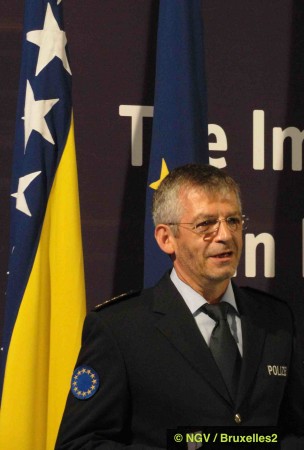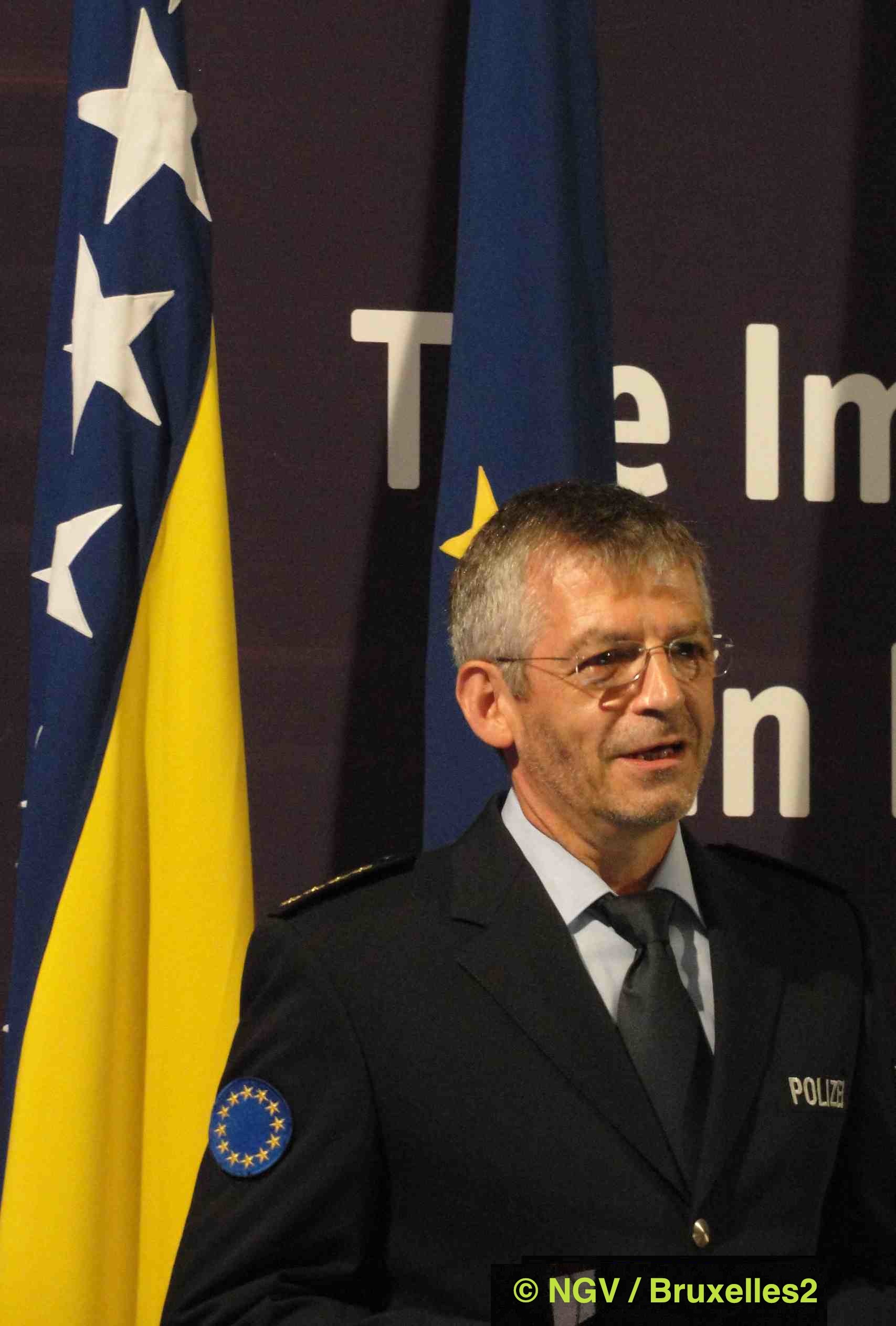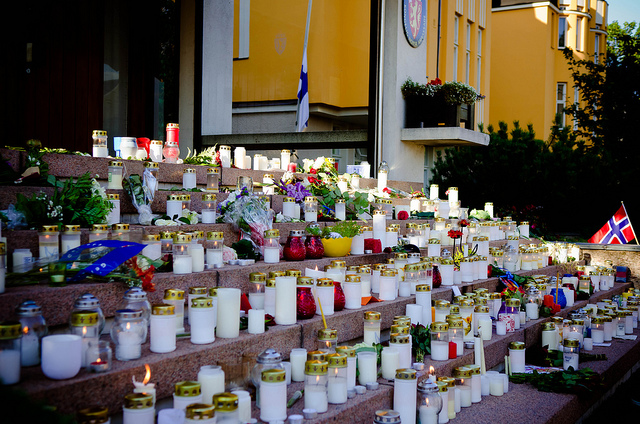First lesson of ten years of policing in Bosnia (Stefan Feller)
 (BRUSSELS2 to Sarajevo) What lessons can be learned from the European Union Police Mission (EUPM/EUPM) in Bosnia and Herzegovina? This was the meaning of a workshop that took place in Sarajevo on Thursday and Friday (attended by B2). The mission that ends in the next few days (June 30 exactly) is symbolic from different points of view. This is the first mission of the European defense policy (ESDP then CSDP). It is also the longest so far in the (short) history of the PeSDC. It has thus evolved, over the years, in a country hollowed out by war, crimes against humanity and genocide, where the differences between communities are not about to be erased, with a legal framework - the agreements of Dayton - which does not facilitate the task of rebuilding the rule of law. Stefan Feller, its leader, was kind enough to draw some lessons for us.
(BRUSSELS2 to Sarajevo) What lessons can be learned from the European Union Police Mission (EUPM/EUPM) in Bosnia and Herzegovina? This was the meaning of a workshop that took place in Sarajevo on Thursday and Friday (attended by B2). The mission that ends in the next few days (June 30 exactly) is symbolic from different points of view. This is the first mission of the European defense policy (ESDP then CSDP). It is also the longest so far in the (short) history of the PeSDC. It has thus evolved, over the years, in a country hollowed out by war, crimes against humanity and genocide, where the differences between communities are not about to be erased, with a legal framework - the agreements of Dayton - which does not facilitate the task of rebuilding the rule of law. Stefan Feller, its leader, was kind enough to draw some lessons for us.
• EUPM ends today, a mission that you followed at several stages, during a whole part of your career?
Effectively. I followed the evolution of this mission in the Police unit of the Council then in the "conduct of operations" of the CPCC and before, when I was at the United Nations I was consulted on the executive mandate, before to arrive here (in Sarajevo) in 2008.
• It is said that this mission is symbolic, that it is a first, in what sense, apart from the chronology?
It was in Bosnia-Herzegovina that the European Union applied its concept of crisis management for the first time. Between 2000 and 2002, I had the opportunity to witness the initial conception of civilian crisis management. The European Union had decided to differentiate the mandates of the missions according to whether their objective was to "reinforce"or of himself"substitute". The First Term"reinforcement" (strengthtening) was later called (and still called today) "executive mandate". While the first type of mission was conceptualized by the description of its functions: observe/monitor, coach/train and advise (monitor , mentor, advise). The broad planning process that took place in 2002 envisaged a duration of three years. Instead, EUPM remained for almost ten years. And its mandate was constantly updated. day on the basis of an internal process of feedback and progress made in Bosnia and Herzegovina.
• Is it possible to keep a strategic line despite the rotation of personnel involved in such a mission?
Yes it's possible. When I look back over the past ten years, I see that we can consistently apply a strategic approach with staff turnover. It's not only possible. But this experience can be transposed, our experience has thus been transferred to Eulex.
• What essential lesson do you draw from this?
When we look at the past 10 years, I can say that we have succeeded in strengthening the mission in areas where there was both a strong will from the host State; the capacities necessary for the mission and the clear commitment of the Member States. These are the two conditions for the success of a mission. If you don't have both the necessary level of mandate and the agreement, the involvement, of the host state, you cannot have the required level. And that will limit the impact of the mission.
• Involve the host state, but how?
He must be consulted more about what he can offer and what he can receive. Do not hesitate to consult, so that the State is really involved in decisions, not only before the start of the mission, but also throughout the mission, during evaluations, debriefings... If the result is positive , we can then consider having a broader approach, more detailed on certain aspects. This is what I remember above all, from this mission in Bosnia-Herzegovina but also from the 16 other missions that I have planned at European Union level (Palestine, Congo, Afghanistan, etc.).
• Wasn't Bosnia-Herzegovina particularly easy for police reform?
When we arrived, the police reform process was far from what we could expect at European level. We needed a broad constitutional reform, which was controversial and difficult to implement. When you have 18 law enforcement agencies and 16 police units, it's not easy. You must establish a common mechanism for the fight against crime. Same thing, if you want to do intelligence, you have to exchange information. We established a vision and presented that to our Bosnian colleagues. It was then necessary to have this proposal approved in all the ministries, to set it up and to debrief our interlocutors as often as possible on the evolution of the project (and blockages). In all the communications I had with (headquarters) in Brussels, that's what I defended involving the host state, following the process on the ground, doing everything to obtain an environment conducive to reform.
(Nb: among the results observed, the EUPM mission succeeded in transforming the State Investigation and Protection Agency (SIPA) into an operational police service endowed with increased powers of intervention on organized crime and fight against corruption, enabled the strengthening of the ministry in charge of security and border control, and assisted the Bosnian police in cross-border authorities).
• Being a policeman helps ?
Certainly yes. When I wanted an interview, it was easier not only because I represented the EU, its power, its States, but also because I was a colleague of my interlocutors. I knew what the police are (...). You see I have these two badges there - and he shows these two shoulders decorated one with the European badge, the other with his national German police badge - it is necessary to have these 2 badges (in order to be able to act ).
- NB: a workshop is organized by the Brussels think tank European Policy Center: "After the EU Police Mission in Bosnia and Herzegovina – Lessons learned for the CSDP?“Thursday (June 14) from 16 p.m. to 18 p.m. With Stefan Feller the head of EUPM, Tobias Flessenkemper, his senior political adviser, Hansjörg Haber, the EU Civilian Operations Commander, and two researchers working on this issue: Damien Helly, from the European Union Institute for Security Studies (EUISS) and Eva Gross from the European Studies Institute of the VUB (Free University of Brussels - Flemish). Registration and Information: here
Read also:


